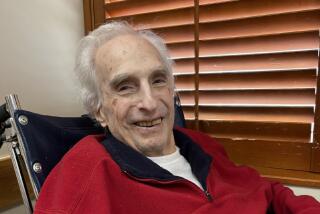Pioneer TV Talk Show Host David Susskind Dies at 66
- Share via
David Susskind, the soft-spoken yet provocative talk show host who produced dozens of movies, plays and television programs, was found dead Sunday in his Manhattan home. He was 66.
Police said Susskind apparently died of natural causes. His body was found in bed in his suite by the manager of the Hotel Wyndham after a friend tried unsuccessfully to reach him by telephone.
Susskind’s sister told police that her brother, who lived alone, was under a doctor’s care for a heart ailment and was to have entered Lenox Hill Hospital today for further examination, police spokesman Sgt. Raymond O’Donnell said.
One of the pioneers of the television talk-show format, the silver-haired Susskind interviewed more than 7,000 celebrities, politicians, authors, civil rights leaders and just plain folks on his program, which began as “Open End” in New York in 1958 and ceased production last year as “The David Susskind Show.” He regretted not being able to book FBI Director J. Edgar Hoover and Pope John XXIII.
Susskind, who once said that he aspired to become the Cecil B. DeMille of television, won numerous accolades for his production work in television, film and stage. His film credits included “Alice Doesn’t Live Here Anymore,” “Requiem for a Heavyweight,” “Lovers and Other Strangers” and “A Raisin in the Sun.”
He introduced television viewers to Laurence Olivier and Ingrid Bergman and produced dramas on Mark Twain, the Watergate scandal and the marriage of Franklin D. and Eleanor Roosevelt.
The garrulous producer was generally credited with trying to improve the caliber of television programming.
In the past year, he was executive producer of four one-man historical television shows for PBS, “Winston Churchill,” “Ike,” “Lyndon Johnson” and “Pope John XXIII.”
Khrushchev Interview
“Pompous and bombastic though he may seem,” one critic wrote in 1980, “Susskind has been a leader in bringing programming of discernible intelligence to TV. Of escapist fluff like “Charlie’s Angels” he will say, ‘To watch such aimless drivel violates my code of morality.’ ”
Susskind probably will be best remembered for his historic 1960 interview with Soviet leader Nikita Khrushchev, which catapulted his career on late-night television.
The premier was in New York to attend a meeting of the United Nation’s Security Council on world disarmament. Susskind scored a coup when Khrushchev, still at odds with President Dwight D. Eisenhower over the shooting down of an American U-2 spy plane over the Soviet Union, agreed to an interview.
Hundreds of viewers and a major sponsor protested giving the Communist leader air time, but many Americans sat riveted in front of their televisions during the show.
“Two things I remember vividly about that,” Susskind said later of his encounter with Khrushchev. “One was his constant poking and slapping me on the back and legs. I was black-and-blue afterward, but I thought to myself, ‘If I hit him back, it means war!’ And the other thing was the box I got from the Kremlin later, which was a jar of caviar, a cigarette box and some Russian cigarettes with a card that said, ‘Nikita.’ ‘What will the FBI do if they hear about this?’ I wondered.”
After the show was aired on Soviet television, a writer for the military newspaper Red Star branded the talk show host “uncultured.”
Early in his career, Susskind’s acerbic tongue caused critics to describe him as an enfant terrible and an “angry young man.”
Susskind was not a diplomat, particularly when he discussed his disappointment with the failings of the entertainment industry.
He once called all actors “sick” and he singled out some as “gooks.” He called a prominent talent agency “nothing but a Ford assembly plant” and branded television programming “banal and stupefying.”
The die-hard New Yorker also had harsh words for Los Angeles, where, despite his links to Hollywood, he declined to live. He once asked musician Artie Shaw, “How can you stand it? This is an intellectual wasteland.”
In an interview in the New York Times in 1982, however, a reflective Susskind said he had softened.
“I think I am less doctrinaire now than I was. I listen more. I’m not so certain about things anymore as I was.”
In the same interview, Susskind described himself as a “traffic director who listens intently. When I come off the air after two hours, I’m wringing wet.”
For Susskind, getting into show business was accidental. As an honor student at Harvard University, he dreamed of becoming a political science professor at his alma mater. After a stint in the Navy during World War II, however, Susskind landed a job as a press agent with Warner Bros. and then Universal Pictures.
Philco Playhouse
Not long after, he became a principal in Talent Associates Ltd., a production company. The “Ltd.,” according to Susskind, was inspired by the name on a pack of English cigarettes. Its first clients in the fledgling television industry included some of the leading producers, writers and directors. The first production was Philco Television Playhouse, a one-hour drama.
Talent Associates was sold to Time-Life Films in 1977. After the sale, Susskind continued to work as an independent producer.
Susskind, born in Brookline, Mass., was twice married and is survived by four children.
They include daughters, Diana Laptook, of Fort Lee, N.J.; Pamela Schaenen and Samantha Susskind, both of New York City, and Andrew Susskind, of Los Angeles. He also is survived by a brother, Murray, of California; a sister, Dorothy Barron, of New York City, and five grandchildren.
The family planned visiting hours from 7 p.m. to 9 p.m. today at the Frank E. Campbell Funeral Chapel in Manhattan, and a private family burial. A memorial service also was planned.
More to Read
The complete guide to home viewing
Get Screen Gab for everything about the TV shows and streaming movies everyone’s talking about.
You may occasionally receive promotional content from the Los Angeles Times.






